When Do Kittens Calm Down? Understanding Feline Behavior
Learn when kittens usually calm down and how to handle their high energy levels. Understand kitten development stages and get tips for promoting calmness.
By: Elizabeth Rikas
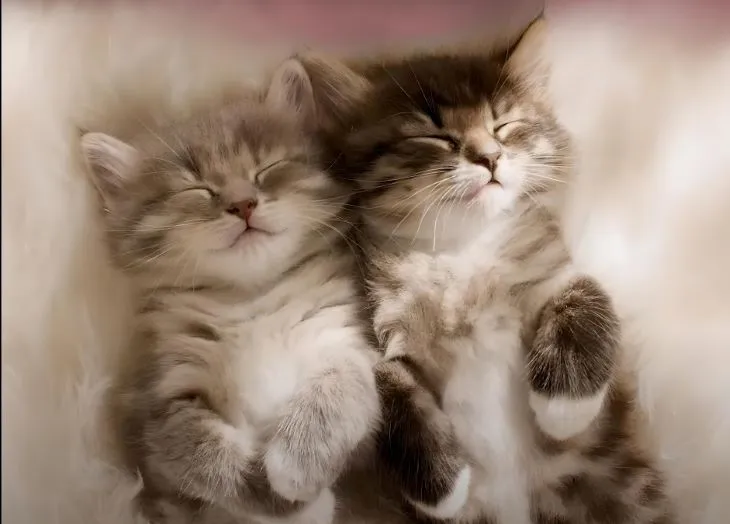
The information in this article is intended to educate cat parents and is not a substitute for veterinary guidance. In case of any concerns about your cat’s health, please talk with your veterinarian.
Kittens are not only cute in their appearance, but their constant jumping, playing, running, climbing, and scratching are also exciting for their owners.
At first, this playful behavior is fun for a few months. But after that, when it becomes a daily routine, many cat owners start thinking – when will their kitten finally calm down?
Let me tell you that as kittens get bigger and older, they naturally become more calm and less hyperactive over time.
If you have further queries, like at what age do cats start settling down? What things cause them to be calmer, and how can you help a hyperactive kitten behave better? Let’s discuss it in detail.
Do Kittens Calm Down As They Age?
Its short answer is yes, kittens calm down as they age. However, the time it takes can differ depending on each kitten’s location. Some kittens may start to calm down as early as 6 months old, while others may take a year or more to settle into a more relaxed lifestyle.
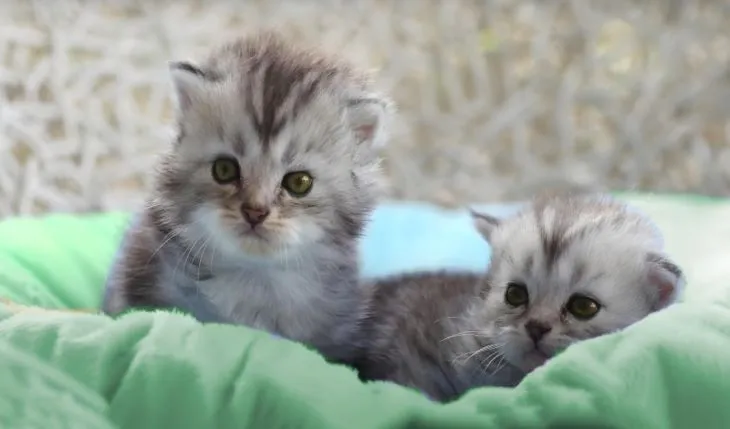
The Kitten Developmental Stage
Kittens go through various stages of development in their first year. Understanding kitten developmental stages helps you provide the best care. Let’s learn the kitten’s developmental stages and how they affect behavior.
Birth To 1 Year Old
During the first year of life, kittens undergo many changes. They’re learning about the world around them, developing their motor skills, and figuring out their place in the household. At this stage, kittens tend to be quite lively and enjoy playing.
After Year 1
After their first birthday, most kittens will calm down and settle into a more predictable routine. They’ll still have bursts of energy and playfulness, but these will be less frequent and intense than during their first year.
Senior Years
As cats enter their senior years (around 7-11), they’ll typically become more relaxed and less active. They may spend more time napping and playing less, but they’ll still enjoy attention and affection from their owners.
What Does A Hyperactive Kitten Look Like?
If you have a hyperactive kitten, you’ll know it. These little balls of energy seem to never stop moving. They’ll run, jump, pounce, and play at all hours of the day and night.
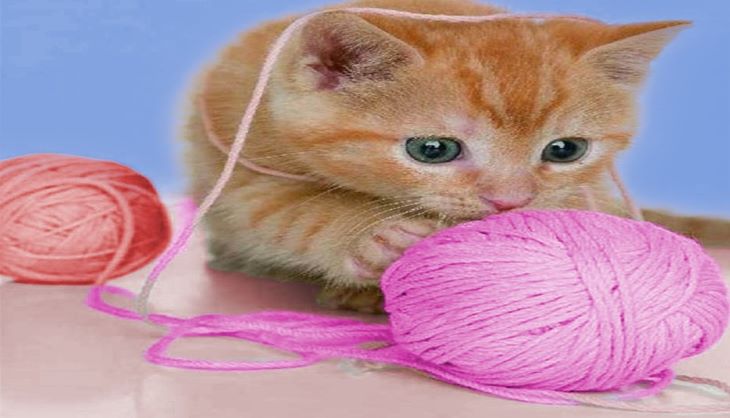
While this can be cute and entertaining initially, it can also be exhausting for their owners.
Factors Affecting Calmness in Kittens
Several factors can influence how quickly a kitten settles and calms down. Breed, environment, and socialization all play a role in kitten calmness. Let’s take a closer look at the factors affecting calmness in kittens.
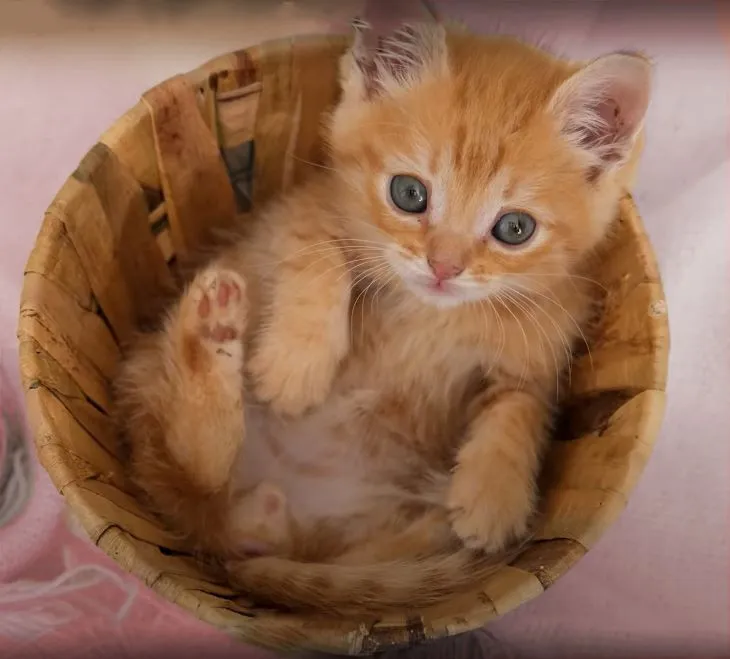
- Breed: The breed also impacts the overall behavior of the kittens. Genetically hyperactive some breeds, like Siamese, Savannahs, and Bengal cats, are known for being more active and vocal than others.
- Environment: Kittens raised in a busy, stimulating environment may take longer to calm down than those in a quieter home.
- Socialization: Kittens who are well-socialized and exposed to different people, animals, and experiences may be more confident and relaxed as they grow up.
Preparing For A Hyperactive Kitten
Bringing home a new kitten means being ready for their high energy. Creating a safe, kitten-proof environment is essential for your new pet. If you’re welcoming a new kitten, there are some things you can do to prepare for their high energy levels:
Have The Right Mindset
It is mandatory to understand that kittens are naturally active and curious, as it is a basic part of their normal development. Don’t expect them to be calm and relaxed right away. After bringing them into your home, the first year should be devoted to them until they are familiar with you.
Outfit Your House
Make sure your home is safe for your new addition. Remove any breakable objects or hazards, and give them lots of toys and scratching posts.
Place Items Strategically
Place your kitten’s food, water, litter box, and bed in separate areas. This will encourage them to move around and explore their new home.
Tips To Manage Hyperactivity In Kittens
If your kitten’s energy levels are getting out of hand, there are some things you can do to help manage their behavior:
Visit The Vet
Make sure your kitten is healthy and up-to-date on their vaccinations. Sometimes, hyperactivity can be a sign of a hidden health problem such as hyperthyroidism.
Complete a Behavior Audit
Look at your kitten’s daily routine and see if there are any changes you can make to help them calm down. Are they moving around enough? Do they have things to keep their minds busy? If you do not, then fulfill them.
Channeling Your Kitten’s Energy
Provide plenty of opportunities for your kitten to play and burn off energy. This might involve toys they can play with, things they can climb on, and puzzles to get their food from.
Provide Self-Play Options For Your Kitten
Ensure your kitten has toys they can play with, like balls and catnip mice. This will help ensure they stay entertained even when you’re away.
Wear Your Kitten Out
Engage in active play sessions with your kitten several times a day.
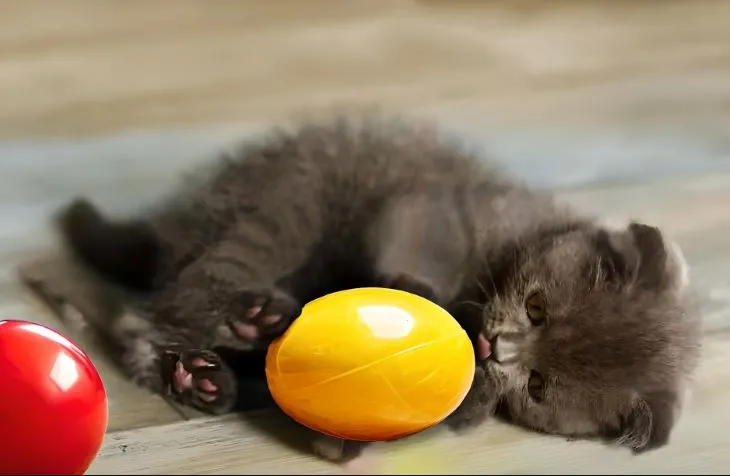
Try using wand toys or laser pointers to get them moving and jumping around.
Get Your Kitten A Friend
Consider adopting a second kitten as a playmate for your hyperactive furball. Having a friend to play with can help burn off excess energy and provide mental stimulation.
Use Food In Your Favor
Try using puzzle toys or scattering small amounts of food throughout the house for your kitten to hunt down. This will make them want to hunt and think, which is good for their brains.
Spay Or Neuter Your Kitten
Spaying or neutering your kitten can help reduce hyperactivity and other unwanted behaviors, like spraying or aggression.
Tips For Playing With A Hyperactive Kitten
Playing with your kitten is a great way to bond and provide mental and physical stimulation.
Here are some tips for playing with a hyperactive kitten:
Engage In Interactive Play
Use wand toys or laser pointers to encourage your kitten to run, jump, and pounce.
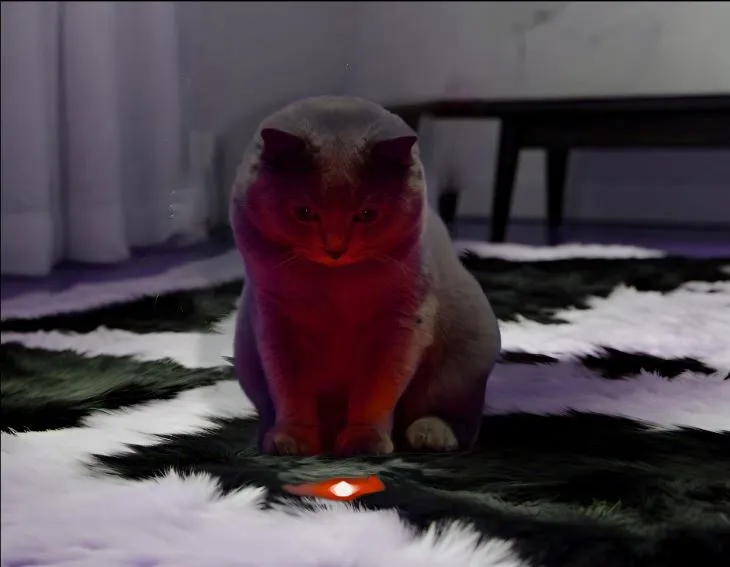
Let them catch their “prey” sometimes so they don’t get upset.
Stimulate Your Kitten With Food Puzzles
Use puzzle toys like feeders or hide little bits of food in different parts of the house for your kitten search. This will make them want to hunt and think, which is good for their brains.
Try Clicker Training
Clicker training is a great way to teach your kitten new behaviors and provide mental stimulation. Use a clicker and treats to reward your kitten for performing desired behaviors.
Laser Training (But Use Caution)
Laser pointers can be a fun way to play with your kitten, but use caution. Always let your kitten catch the “prey” at the end of the game to avoid frustration, and never shine the laser in their eyes.
Importance Of Interaction With Your Feline
Engaging with your kitten gives them the mental exercise they need. Let’s learn the importance of interaction with your kitten and how it contributes to their overall health and happiness.
- Interacting with your kitten is crucial for their overall well-being.
- Regular playtime and training sessions strengthen your bond.
- Engaging activities provide essential mental stimulation for your feline friend.
- Quality interaction time supports your kitten’s physical and emotional health.
- Consistent interaction helps your kitten develop into a well-adjusted adult cat.
When Do Kittens Calm Down? Frequently Asked Questions
Conclusion
Kittens are naturally active and curious, but calm down as they age. By providing plenty of opportunities for play and mental stimulation, you can help your kitten burn off excess energy and settle into a more relaxed routine. Remember to be patient and understanding during this exciting time in your kitten’s life, and enjoy watching them grow and learn.
